Interview With THE PIRATES OF SOMALIA Director & Star, Bryan Buckley & Barkhad Abdi
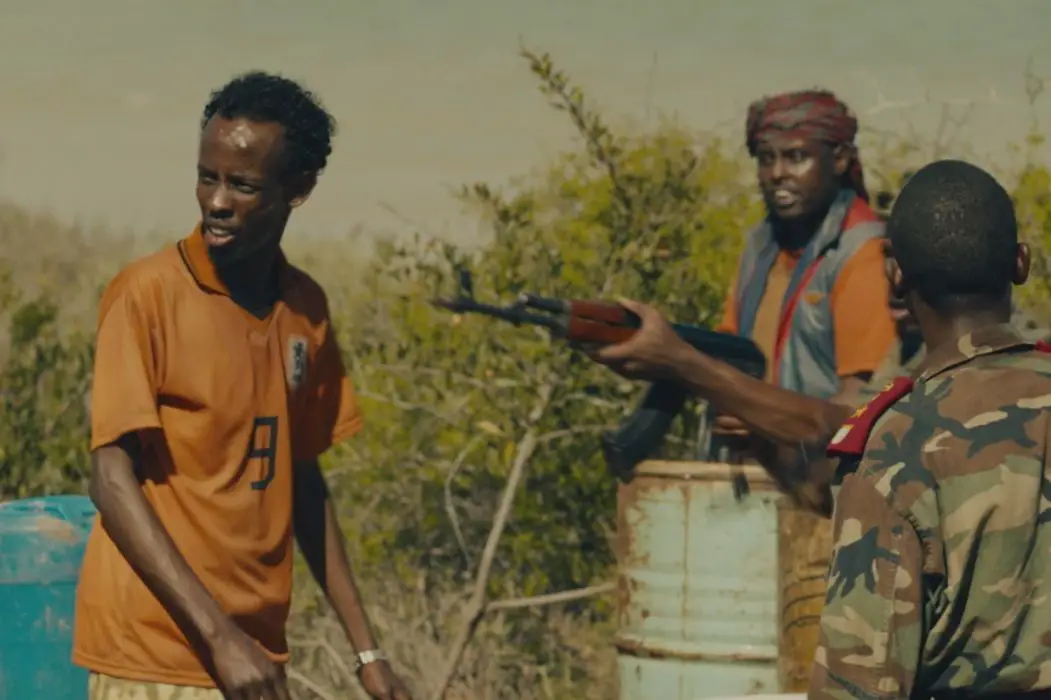
Alex Arabian is a freelance film journalist and filmmaker. His…
Oscar nominees Bryan Buckley and Barkhad Abdi of The Pirates Of Somalia are becoming household names in the film industry. Buckley made a name for himself with a steady stream of short films and a unique eye for commercial directing – he was coined “The King of the Super Bowl” by the New York Times, directing over 50 Super Bowl commercials since 2000.
Buckley’s work has been inducted in the Museum of Modern Art, and an Adweek Readers Poll named him the Commercial Director of the decade in 2010. His outstanding film, The Pirates Of Somalia, marks his second feature film in front of the 2015-Sundance-premiered comedy The Bronze, and its primed to be a critical success. Buckley is also quietly known for his humanitarian efforts.
Abdi burst onto the scene with the Paul Greengrass-directed Captain Phillips, earning him an Oscar nomination in his acting debut. Since then, he’s seen consistent work in a variety of roles with major talent at the helm including Gavin Hood, Denis Villeneuve, and the Safdie brothers. On top of his acting, he has done humanitarian work in Africa, paying forward the good fortune he’s received from the tirelessly hard work he’s put into his craft.
Abdi is the real deal, embracing the mindset of a student, as all great actors do, with goals to become a director in his career; he has more than what it takes, according to Buckley. Abdi plays quite the opposite of his Somali Captain Phillips character in The Pirates Of Somalia, bringing an infectious confidence to the role, playing an adroit factotum to perfection as the translator to Evan Peters’ Jay Bahadur.
I had a chance to speak with both Buckley and Abdi about the making of The Pirates Of Somalia, wherein we discussed the inspiration behind it, Jay Bahadur, Buckley’s metamorphic directorial style, the onscreen chemistry of the cast, namely Abdi and Peters’ bromance, Buckley and Abdi’s humanitarian pursuits, Abdi’s evolution as an actor, his fascinating life before becoming an actor, and what’s next for their respective careers.
Alex Arabian for Film Inquiry: You’ve had an eye for socially conscious films that explore important subjects. What drew you to adapting Jay Bahadur’s book?
Bryan Buckley: I worked with refugees – with Somali refugees, specifically, in Kenya viewing HDR [Human Development Reports]; I think it became a camp. I fell in love with the Somalis and I also met a crew of BBC reporters up there at the time that were telling me how they couldn’t get into Somalia to tell the Somali side of the story – as far as what their struggles were, it was just too dangerous.
When Jay’s book came out, I was shooting another film, Asad, [and] I was using his book as reference material and I was just blown away that this is a kid who just went there, forgets anything just recklessly in terms of his own protection, to pursue something – pursue the truth, pursue giving out inside ends of both the piracy and the democracy that’s going on there at the time.
I, like he, fell in love with the country and the culture the more you knew about it, and I just kind of felt like this kid’s story needed to be told, and it needed to be told to the world. So that’s essentially what happened.
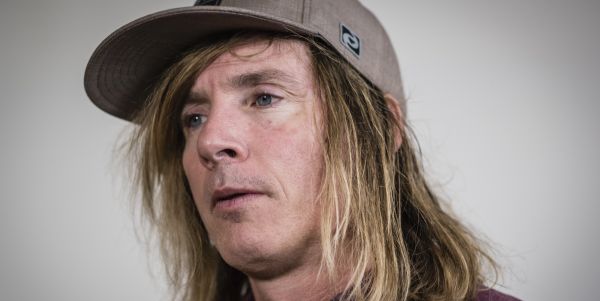
How much did Bahadur have in the making of the film?
Bryan Buckley: Jay was there from the get-go. The big thing with dealing with him was they were curious whether I was going to base it on the book or on Jay’s life; they didn’t know what my take was going to be on it. And I said I really wanted to take over – because first chapter, Jay talks about himself – and expand upon that; I thought he was a critical component [to the story]. So I did additional interviews with him and he would see drafts and where we’re at, etc.
He came down there – he actually has a tiny cameo in the film – he was there the whole way through. The two things I didn’t want to have happen was [to] show Somalis and they sit there and think we completely misfired, and to show it to Jay and say “that’s not my story.” So those two things were really important to make sure that both sides were open to it, or thought that we did justice on that. And in the end we were contacting Jay all the time.
Your direction was extremely sure-handed in the beginning, but morphed into an almost guerrilla-style when Bahadur ventures into Somalia and becomes increasingly manic, matching his journalistic style. Was this always your intention?
Bryan Buckley: Yeah, the idea was sort of: take us from the beginning of the film – that could be some traditional, going nowhere story, right, and sort of pretty straightforward filmmaking at that point. And then start to evolve it into – because you move into his head more and more as the movie progresses – I wanted the audience to be inside Jay’s head, inside Somalia.
So the use of not using subtitles in making Barkhad doing all these translations – the Abdi character; the audience is always one step behind. We’re always trying to gather the information that we can look for clues that were always there what was going on. Ultimately that frenzy that builds at the end – yes, it was all by device.
We sort of put you in that mindset of tension; there was a dream sequence in the beginning as they hit the ground in Somalia – that was kind of a shock and awe moment that I wanted to be stuck in the back of peoples’ minds as they moved through the rest of the story and [say] like “whoa, that was hardcore.” You know, the shooting on the runway. And even though that was in his [Bahadur’s] head, it was based on a true dream.
And, by the way, that was Jay Bahadur doing the cameo of getting shot. That was Jay. And that was based on Jay’s dream for real. And I just wanted to do everything I could to get the audience in Jay’s headspace there.
Speaking of which, can you speak a bit about how you integrated the dream sequences, flashes of Tracy, and animated sequences so seamlessly into the narrative of the film?
Bryan Buckley: Well, some of that stuff is evolutionary. I felt like it was really important that as soon as the audience would get comfortable with the narrative, that I kind of move into it, tell it in a different way – it was just playing with that concept. So I was going to do voice-over, you know, him [Bahadur] sort of reminiscing back about Tracy, which was one of the original scripts that I wrote.
And eventually, because you write a script as a director – I mean I wrote it first, because you’re a writer, and then often you go back and look at it as a director and start saying “god, I’m terrible, why would you do that, that’s not interesting,” like competing with yourself. “How can I tell a better story than this? Where can I push this, visually, to be more interesting?”
So the Tracy concept, originally, was voice-over, and that’s just not interesting. And then when he arrives at the room, because of these [mosquito] nets, I go “what if I use imagery and sort of portray that.” Just try different ways – because that’s how I feel like when you’re in love – that person’s everywhere, and then the mosquito net sort of becomes a metaphor, right? And so that’s interesting, we’ll really project that, we’ll take these images and place them in there.
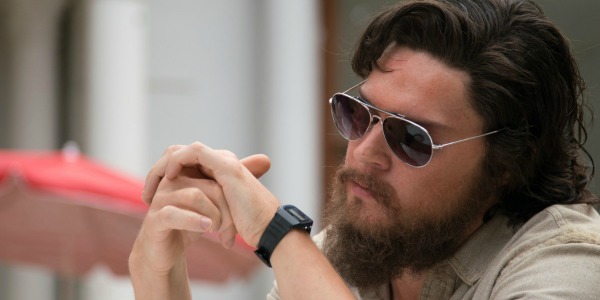
The only animation sequence originally was the history of piracy, or Boyah’s run – that was always coming out a music video. But again, that piece sort of evolved as I began adding the animation, and then I added a third piece of animation at the end of the movie when he’s [Bahadur] in his room after the Captain Phillips episode, just because I felt like this really impacted [it] because it was early into the cut and I want to add another piece to this because I feel that we need it.
And that sequence, I kept upgrading that to the more interesting visual thing. Each step, sort of the looking at it in the edit: “how do I get more into his head in using these visual pieces?” I remember the dance sequence thing when he meets Katlyn for the first time, there was nothing there. “I think it needs something, I don’t think it’s going to hit me.” And all of the sudden it hit me, and I called the producer and said “I need 25 blue outfits and dancers by tomorrow;” like we’re going to figure out something that’s going to make this interesting, visually.
And that’s the thing, filmmaking to me is evolution, it’s risk-taking; you take risks, you pursue something. Sometimes it works and sometimes it doesn’t work, but if you don’t pursue, and especially this film, I felt it’s so critical – I didn’t want to be telling a narrative in a standard manner because I needed an audience to sort of shock and get them to see something they haven’t seen before or something that sparks their brains and opens it up so I can tell more of the story. Because if they start saying, “I’ve seen it before,” then we’re in trouble, they’re not going to watch this movie; it was so important to me.
Evan Peters and you, Barkhad, go above and beyond in your roles. You very much seem up to the evolutionary aspect of Bryan’s filmmaking style. Bryan, what can you say about working with Evan and Barkhad?
Bryan Buckley: Honestly, it has been the best professional experience I’ve ever had. I said to Evan when we started this thing, because I knew it was going to be a life-changing experience, because we’re working with many non-actors and refugees and what-have-you down there, “you’re literally going to be immersed into this world.” I was like, “please Barkhad, please, please, please.” I hope he takes this film because I knew the responsibility.
Barkhad’s piece wasn’t just about being an actor here; I knew he was a critical linchpin with the community, because there’s a lot of people to get exploited in films like this and that they need to know that Barkhad came in, that the community would trust that this movie was going to serve their proper purpose in the end. You know, he’s a leader in the community and he was very involved with everybody down there as far as [he] knew everyone, and we’re finding actors whether in the street or in the basin or another actor and Barkhad was certainly knowledgeable to that.
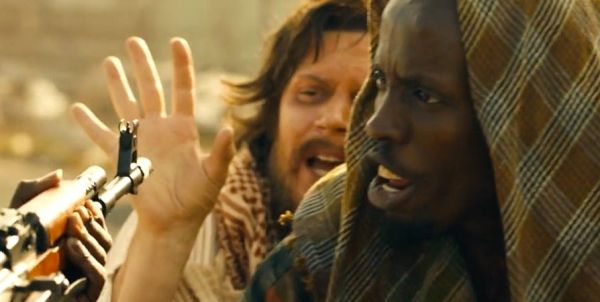
So we all worked together towards creating this. Watching their relationship, Evan flies into this and then Barkhad arrives, their friendship – like my favorite moment onset, we did an all-night shoot and we kept on having to tell everyone, “we’re all night.” And all-night shoots, if you ever do them, they’re the worst, blah, blah, blah. And we kept on having to tell everyone to stop laughing because they were ruining our sound. And Evan and Barkhad didn’t leave, they’re all outside and no one’s in their trailers – everyone’s outside all night long talking, hanging, and thinking it was a party. That was the military scene running in and out of the president’s office.
And I’m like, “that, to me, if I were to pick a special moment – when we know we’re creating something, an ecosystem that’s special and very positive in telling a story and then people are laughing and people are getting paid and we’re doing something while we’re enjoying ourselves?” That chemistry was awesome. We pretty much shot in order, so that hug at the end was very real between the two guys [Evan and Barkhad]. That was our last shooting.
Any exciting projects in the future? Any plans to return to your commercial roots?
Bryan Buckley: I’m on a Super Bowl spot that will help pay for the next venture like this, I guess. I gotta go make some money now! So right now it’s called Super Bowl Season, so I’m jumping into that and doing feature stuff right after that. It’s fun.
Barkhad Abdi
Your performance is magnetic. Whereas you played someone naive and unsure of themselves in Captain Philips, you play a confident, all-knowing “Sultan,” to quote Bahadur. What preparation did you do for this film?
Barkhad Abdi: Well, I had a real life experience. I went with Adeso to Somalia to do a military work there. You know, they took me in a similar car that we did the movie with, that they took Jay with. So a similar truck, bodyguards, so that helped me. I even interviewed some fisherman for CNN Inside Africa that was with us at the moment. So I believe that kind of helped my advantage to better my character and have a full ground understanding of the responsibilities of this character.
How does working with Bryan differ from working with Paul Greengrass or Denis Villeneuve?
Barkhad Abdi: Paul Greengrass, Denis, Bryan – they’re all great directors. Each one of them has his own way to work with [actors]. But what differentiates Bryan from Denis and Paul is his sense of humor and his just very down-to-earth demeanor. And we did this together and we got along just fine. I really love working with him.
He’s different, you know, he’s really unique in his own way and I love that and how passionate he is about the whole Somali situation and how he wanted to show the accurate way – it’s really amazing and I love that about him. I’m sure you can understand how hard it is to find someone that will do that.
Absolutely. Was is odd or surreal approaching the scene that contained the Captain Phillips hostage event knowing that it was your first film?
Barkhad Abdi: No, you know, with this movie, what I like about it is it goes deeper into the topic of the piracy. It shows a wider view of how the situation is in Somalia and how these pirates – who are they and how the people perceive them. So it was really good that I did this film because I think that it kind of completes that story; with Captain Phillips, it’s just one incident. People can have a lot of questions because it’s just certain people that were stuck in that situation. And you cannot have a full understanding of the piracy or just a lot of people in that situation.
But with this film, I think there’s a wide variety of ways you can look at it and very different point of views that we manage to show. I was really glad how it turned out. I didn’t think it was going to be this well put-together because we had a lot of non-actors that were in the movie with us, and, amazingly, they all did great. So I’m really proud of them and proud of this film as well.
One thing that you always seem to keep in your roles is a keen sense of humor. Have you considered doing more comedic roles?
Barkhad Abdi: Well, you know, I’m more more comfortable that way. I’m not a very serious person; that’s who I normally am – happy, just always laughing no matter how things are; that’s just who I am. And that’s some of the Somali culture I inherited. Of course I would love more comedic roles, but at the same time, this film allowed me to do a different range in my craft and my acting skills.
I think it was a great experience for me; it’s something totally different than what people know me as, so it was a risk in that way to see if people would find you funny, even though I’m confident that I am this person, not that one. You know, at the end of it, it’s just how people perceive your performance, and so far, I’m really proud of it.
What was it like working with Evan Peters?
Barkhad Abdi: Well, working with Evan was amazing and I really enjoyed working with him. We sort of got to know each other throughout the movie. But he was a really helpful person and he had that sense of humor in him too so we got along fine as the movie went by. That’s how we get to know each other. But I thought he did an amazing job in this movie and our relationship and how we became friends reflects on the movie. I think that wasn’t planned. That happened.
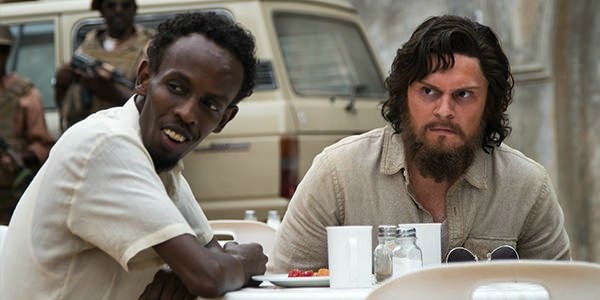
Me and him – how we would get to know each other, it was crazy, [just like] how they [Bahadur and Abdi] get to know each other. All things aren’t smooth like that – as you know and realize, everyone doesn’t get along with everyone. But in this situation, me and Evan, we got along just fine and we became buddies and we had a good time.
You escaped the civil war in Somalia in 1992. Do you remember much of your life in Somalia before you left?
Barkhad Abdi: My memory in Somalia, that was a peacetime. It was all beautiful. We lived in a big villa. Everyone was my parents – wasn’t my parents, was like a parent and everyone was friendly. There was nothing violent that was going on, and then the war happened and it was just overnight clash and chaos and gun-shooting that was never stopping and women screaming.
It was really horrifying at a very young age to see that. But thank God we managed to get away and find a way to leave the country; and we ended up in Yemen where my dad was a teacher.
You used to direct videos. You’ve worked with some fantastic directors, as we discussed. Have you considered directing at some point in your career in the future?
Barkhad Abdi: That’s my passion: as a filmmaker. That’s my goal. One day I want to direct something. But I’m not in a hurry to direct anything now, so I’m just going to take my time. I figure there’s a lot that I need to learn. Every time I work with a director, I learn something new – how it’s done. There’s a lot that I need to learn.
Bryan Buckley: I’ve been trying to push him, trust me. He has all those skill-sets. You know, he has the skill-sets, I think, to be a great director.
Barkhad Abdi: Thank you!
Film Inquiry would like to thank Bryan Buckley and Barkhad Abdi for taking the time to talk with us.
The Pirates of Somalia gets a limited release in US cinemas on December 8th, 2017 – for international release dates, check here.
Read my review of The Pirates of Somalia here.
https://www.youtube.com/watch?v=trFQOslCa6U
Does content like this matter to you?
Become a Member and support film journalism. Unlock access to all of Film Inquiry`s great articles. Join a community of like-minded readers who are passionate about cinema - get access to our private members Network, give back to independent filmmakers, and more.
Alex Arabian is a freelance film journalist and filmmaker. His work has been featured in the San Francisco Examiner, The Playlist, Awards Circuit, and Pop Matters. His favorite film is Edward Scissorhands. Check out more of his work on makingacinephile.com!













